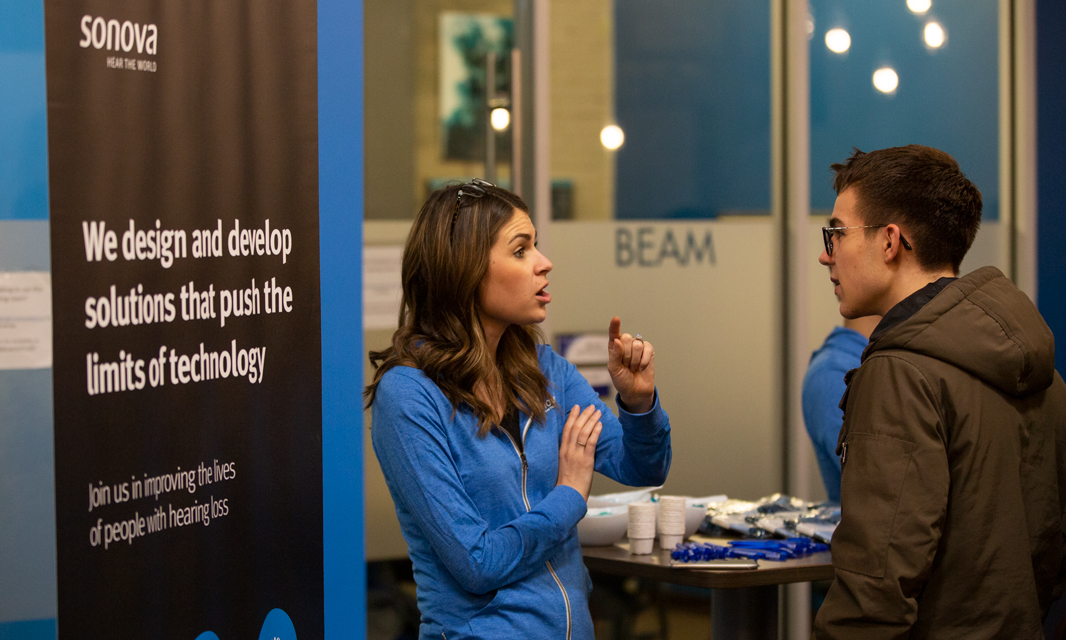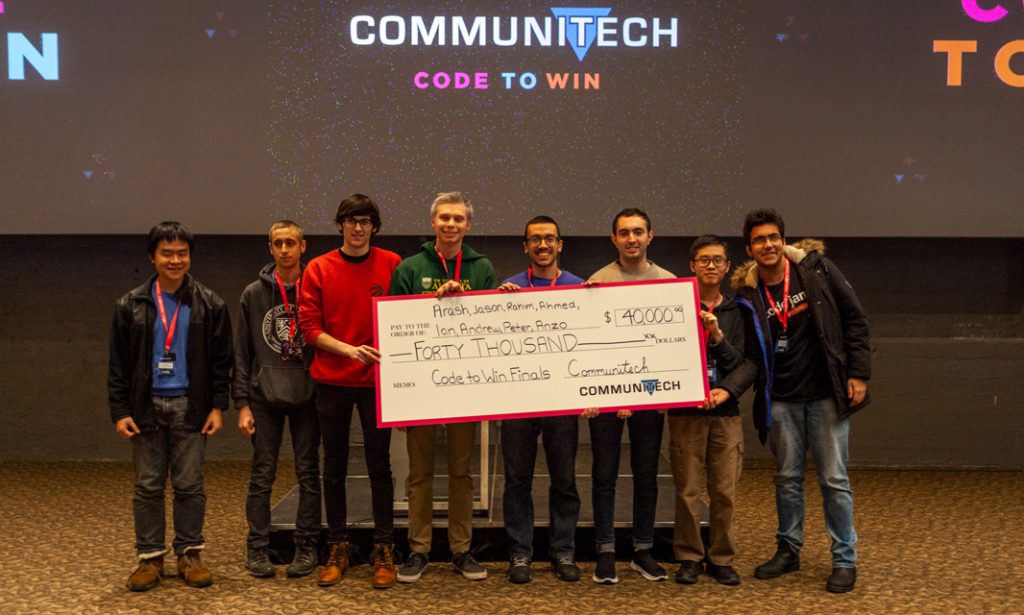Canada’s top computer science and programming students are getting smarter, and just a little bit richer.
Nine of them scored a perfect 100 per cent on the Code to Win challenge hosted Saturday by Communitech.
Typically, the first prize of $5,000 would go to the person who finished the complex series of four programming problems in the fastest time.
And Tina Wilton, Communitech’s Talent Program Manager, was delighted to present that oversized first-place cheque to a second-year computer science student from the University of Toronto, Michael Nematollahi, who finished the challenge in 23 minutes and six seconds, well under the two-hour limit allowed for the competitors.
But the Code to Win organizers were so impressed by the talent pool drawn from across the country to the one-day event, now in its fifth year, that the other eight perfect scores were also awarded a matching $5,000 prize.
Those winners were: Ian DeHaan, University of Alberta; Rahim Mammadli, University of British Columbia; and, all from the University of Waterloo, Arash Bidgoli, Peter Ralbovsky, Andy Rock, Ahmed Sabie, Anzo Teh and Jason Yuen.
Code to Win preliminary rounds are held on campuses across the country each fall, with top finishers being invited to the finals at Communitech. This year’s Code to Win attracted the most out-of-province participants since it began, with airline tickets booked for 26 of the 75 finalists. Travel and accommodation expenses, and the prize money, are provided by Communitech and its sponsoring partners: Deloitte, Google, Manulife, Rogers and Sonova, as well as the federal and provincial governments.
For the corporate sponsors, Code to Win is an opportunity to see some of Canada’s best and brightest young software engineers all in one place. Some of the firms hold one-on-one interviews with students, while others share the message about working in their company.

Sarah Araujo of Sonova chats
with a Code to Win competitor.
(Photo: Joe Martz for Communitech)
Sarah Araujo, Talent Acquisition Business Partner for the Kitchener office of Swiss-based hearing aid company Sonova, was leading a team of four staff members who interviewed 10 participants. Sonova is hunting for the next cohort of software developers to innovate the tech that goes into hearing aids, and to assist in the next generation of mobile hearing aid tech.
Why would a 21-year-old programming student want to work with a hearing aid company? Greg Dyce, Manager Software Development for Sonova, said that the core reason is “That they will get to develop meaningful solutions that help people with their day-to-day living, rather than develop something that is just another distraction.”
Dyce and Araujo said new hires at Sonova benefit from the corporate commitment to talent development, a commitment that includes work experience at Sonova’s Swiss headquarters in Stäfa, outside Zurich.
Sonova has also committed to an ongoing connection with student talent in Waterloo Region, having hired its second cohort of co-op students for its new innovation lab at Communitech.
For Walid Ibrahim, 5G Lab and Partnership Manager for Rogers, Code to Win is part of his company’s interest in the tech ecosystem in Kitchener-Waterloo. Rogers has recently established an innovation lab at Communitech and Ibrahim has added two University of Waterloo co-op students and hopes to add two more.
For Kristin Flannigan, Engineering Community Manager at Manulife, Code to Win “helps strengthen the partnership we already have with Communitech through our innovation lab space here.” Flannigan says that Manulife hires 50 to 60 co-op students across the company every term: “We love our co-op students, so this is a great initiative.”

Eight of the top nine competitors at
the Code to Win challenge at Communitech.
(Photo: Joe Martz for Communitech)
The top finisher, second-year computer science student Michael Nematollahi, was interested in the pitches from the recruiters, but says he is considering his options: “Sure, I’m interested in an internship, but making a full-time commitment — that’s not something that I’m ready to commit to, because I don’t know what I want to do in the long term.”
Arash Mahmoudian Bidgoli, a first-year UW student who took home a $5,000 prize, was impressed with the competition: “It’s cool to see all this talent in one place.”
This was the second appearance at Code to Win for Ian DeHaan, who also claimed $5,000. The second year computing science student from Alberta hadn’t lined up any interviews because he already has an internship this summer at a Toronto satellite communications firm, and because “I think a lot of the employers (here) are looking for students closer to graduation.”
DeHaan says he enjoys Code to Win because he likes the challenge of competing with others to solve problems. He’s committed to five programming contests this school year, including one in Atlanta next month. “I like solving problems for the sake of solving problems, but I do enjoy beating other people to the solution.”
Wilton said that in the three years she has been working on Code to Win, this has been one of the most talented groups she has met.
“Just in conversation with them, you realize they are bright, involved, and at the cutting edge of computer science.”

